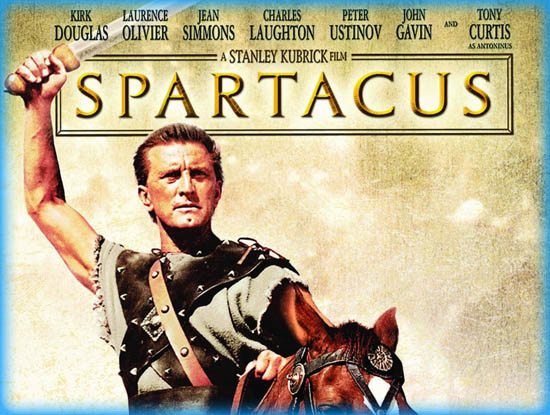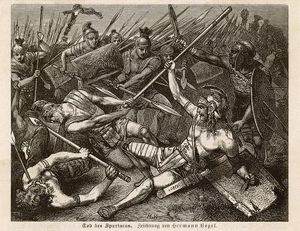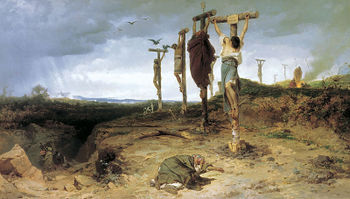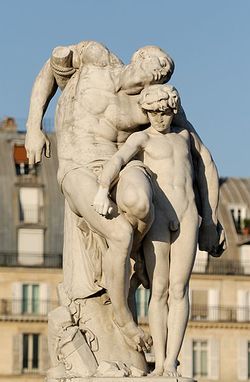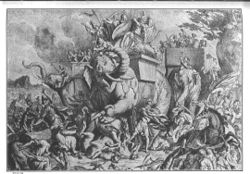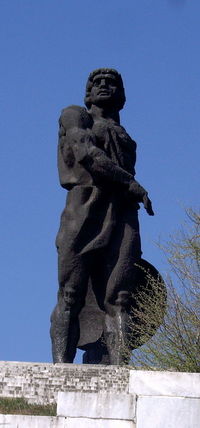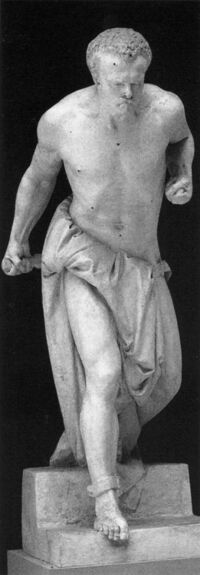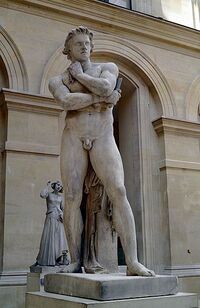Difference between revisions of "Category:Spartacus (subject)"
| (21 intermediate revisions by the same user not shown) | |||
| Line 5: | Line 5: | ||
{{WindowMain | {{WindowMain | ||
|title= [[People]] -> Spartacus | |title= [[Maccabees|Maccabean Period]] -> [[People]] -> Spartacus | ||
|backgroundLogo= Bluebg_rounded_croped.png | |backgroundLogo= Bluebg_rounded_croped.png | ||
|logo= Logo.png | |logo= Logo.png | ||
|px= 38 | |px= 38 | ||
|content= [[File:Spartacus.jpg| | |content= [[File:Spartacus.jpg|550px]] | ||
''Spartacus''' was a Thracian gladiator and leader of a slave revolt in 73-71 BCE. | '''Spartacus''' was a Thracian gladiator and leader of a slave revolt in Italy in 73-71 BCE. His story is roughly contemporaneous to, and somehow parallels, that of the [[Maccabees]]. | ||
* | * @2011-18 An article by [[Gabriele Boccaccini]], University of Michigan. | ||
}} | }} | ||
{{WindowMain | {{WindowMain | ||
| Line 22: | Line 22: | ||
|px= 38 | |px= 38 | ||
|content= | |content= | ||
[[File:Spartacus | [[File:Spartacus Vogel.jpg|thumb|300px|[[Death of Spartacus (1882 Vogel), art]]]] | ||
[[File: | [[File:1878 Bronnikov.jpg|thumb|350px|[[The Cursed Field (1878 Bronnikov), art]]]] | ||
[[File:Spartacus_Barrias.jpg|thumb| | [[File:Spartacus_Barrias.jpg|thumb|250px|[[The Oath of Spartacus (1871 Barrias), art]]]] | ||
There is nothing that historically connects Spartacus with the Jews and Jewish and Christian origins. Spartacus was a Thracian and lived in Italy under Roman rule when Judea was still under the [[Maccabees]] before the [[Roman Period|Roman conquest]]. However, the similarities with the Maccabean revolt and the fact that 6,000 of his followers were crucified, has made him a character of some interest for [[Second Temple Studies]]. | |||
There is nothing that historically connects Spartacus with the Jews and Jewish and Christian origins. Spartacus was a Thracian and lived in Italy when Judea was still under | |||
Since the 18th century, numerous fictional | Since the 18th century, numerous fictional works praised Spartacus as a freedom fighter and a champion of the oppressed. The unlikely connection between Spartacus and the Jews was made explicit for the first time by [[Arthur Koestler]] in 1939. In [[The Gladiators (1939 Koestler / Simon), novel]] one of Spartacus' companions was a member of the Jewish sect of the Essenes and his egalitarian views shaped the revolt. | ||
Following this path, [[Howard Fast]], in 1948 author of a celebrated novel on the [[Maccabees]], made in 1951 Spartacus the leader of a multiethnic army. Among his closest followers and friends was also a Jewish gladiator, David. The two major works of the 1950s, namely, [[Spartaco (Sins of Rome / 1953 Freda), feature film]] and [[Спартак (Spartacus / 1954 Khachaturian), ballet music]], however, did not develop the Jewish theme, drawing inspiration from [[Spartaco (1873 Giovagnoli), novel]]. | Following this path, [[Howard Fast]], in 1948 author of a celebrated novel on the [[Maccabees]], made in 1951 Spartacus the leader of a multiethnic army. Among his closest followers and friends was also a Jewish gladiator, David, now presented of a sort of "Maccabean" warrior. The two major works of the 1950s, namely, [[Spartaco (Sins of Rome / 1953 Freda), feature film]] and [[Спартак (Spartacus / 1954 Khachaturian), ballet music]], however, did not develop the Jewish theme, drawing inspiration from [[Spartaco (1873 Giovagnoli), novel]]. | ||
Directly inspired by Fast's novel, [[Spartacus (1960 Kubrick), feature film]] gave [[Harold J. Stone]] a relevant role as David, the Jewish companion of Spartacus. Seregi's 1968 choreography of Khachaturyan's ballet also introduced the character of "Gad, a Jewish gladiator." The iconic scene: "I am Spartacus!" was spoofed in [[The Life of Brian (1979 Jones), feature film]] in the scene of the crucifixion of Brian. | Directly inspired by Fast's novel, [[Spartacus (1960 Kubrick), feature film]] gave [[Harold J. Stone]] a relevant role as David, the Jewish companion of Spartacus. Seregi's 1968 choreography of Khachaturyan's ballet also introduced the character of "Gad, a Jewish gladiator." The iconic scene: "I am Spartacus!" was spoofed in [[The Life of Brian (1979 Jones), feature film]] in the scene of the crucifixion of Brian. | ||
Among the most recent works on Spartacus, the only ones to make relevant the Jewish connection were [[Spartacus (1990 Dresdon, Wilkins / 1968 Seregi, Khachaturyan), filmed ballet]], and [[Spartacus (2004 Dornhelm), TV mini-series]]. | |||
====External links==== | ====External links==== | ||
*[http://en.wikipedia.org/wiki/Spartacus Wikipedia.en] | *[http://en.wikipedia.org/wiki/Spartacus Wikipedia.en] | ||
}} | |||
{{WindowMain | {{WindowMain | ||
|title= | |title= Ancient Sources | ||
|backgroundLogo= Bluebg_rounded_croped.png | |backgroundLogo= Bluebg_rounded_croped.png | ||
|logo = contents.png | |logo = contents.png | ||
|px= 38 | |px= 38 | ||
|content= | |content= | ||
* Plutarch, ''Crassus'' (8-11) | |||
* Appian, ''The Civil Wars'' (1.14.111, and 116–121.1) | |||
* Sallust, Fragments from Book 3 of ''The Histories'' | |||
* Livy, ''Periochae'' (95–97) | |||
* Lucius Annaeus Florus, ''Epitome of Roman History'' (2.8) | |||
* Sextus Julius Frontinus, ''Strategies'' | |||
* Paulus Orosius, ''History against the Pagans'' (5.24) | |||
}} | }} | ||
| Line 67: | Line 64: | ||
{| id="mp-right" cellpadding="2" cellspacing="5" style="width:100%; vertical-align:top; background:#f5faff; background:transparent;" | {| id="mp-right" cellpadding="2" cellspacing="5" style="width:100%; vertical-align:top; background:#f5faff; background:transparent;" | ||
{{WindowMain | {{WindowMain | ||
|title= [[ | |title= See [[Maccabees]] | ||
|backgroundLogo= Bluebg_rounded_croped.png | |backgroundLogo= Bluebg_rounded_croped.png | ||
|logo= contents.png | |logo= contents.png | ||
|px= 38 | |px= 38 | ||
|content= [[File: | |content= [[File:Maccabees Picart.jpg|250px]] | ||
}} | }} | ||
{{WindowMain | {{WindowMain | ||
|title= | |title= Highlights | ||
|backgroundLogo= Bluebg_rounded_croped.png | |backgroundLogo= Bluebg_rounded_croped.png | ||
|logo= | |logo = contents.png | ||
|px= 38 | |px= 38 | ||
|content= [[ | |content= | ||
* [[The Gladiators (1939 Koestler / Simon), novel]] | |||
* [[Spartacus (1951 Fast), novel]] | |||
* [[Spartacus (1960 Kubrick), feature film]] | |||
* [[Spartacus (1968 Seregi / 1954 Khachaturian), ballet]] | |||
* [[Spartacus (1990 Dresdon, Wilkins / 1968 Seregi, Khachaturyan), filmed ballet]] | |||
* [[Spartacus (2004 Dornhelm), TV mini-series]] | |||
}} | }} | ||
[[File:Spartacus Sandanski.jpg|thumb|200px|left|Gigantic bronze statue of Spartacus erected at Sandanski, Bulgaria during the Communist period]] | |||
[[File:1847 Vela.jpg|thumb|200px|left|[[Spartacus (1847 Vela), art]]]] | |||
[[File:Spartacus Foyatier.jpg|thumb|200px|left|[[Spartacus (1830 Foyatier), art]]]] | |||
|} | |} | ||
|} | |} | ||
Latest revision as of 10:03, 31 July 2018
|
Spartacus -- Overview There is nothing that historically connects Spartacus with the Jews and Jewish and Christian origins. Spartacus was a Thracian and lived in Italy under Roman rule when Judea was still under the Maccabees before the Roman conquest. However, the similarities with the Maccabean revolt and the fact that 6,000 of his followers were crucified, has made him a character of some interest for Second Temple Studies. Since the 18th century, numerous fictional works praised Spartacus as a freedom fighter and a champion of the oppressed. The unlikely connection between Spartacus and the Jews was made explicit for the first time by Arthur Koestler in 1939. In The Gladiators (1939 Koestler / Simon), novel one of Spartacus' companions was a member of the Jewish sect of the Essenes and his egalitarian views shaped the revolt. Following this path, Howard Fast, in 1948 author of a celebrated novel on the Maccabees, made in 1951 Spartacus the leader of a multiethnic army. Among his closest followers and friends was also a Jewish gladiator, David, now presented of a sort of "Maccabean" warrior. The two major works of the 1950s, namely, Spartaco (Sins of Rome / 1953 Freda), feature film and Спартак (Spartacus / 1954 Khachaturian), ballet music, however, did not develop the Jewish theme, drawing inspiration from Spartaco (1873 Giovagnoli), novel. Directly inspired by Fast's novel, Spartacus (1960 Kubrick), feature film gave Harold J. Stone a relevant role as David, the Jewish companion of Spartacus. Seregi's 1968 choreography of Khachaturyan's ballet also introduced the character of "Gad, a Jewish gladiator." The iconic scene: "I am Spartacus!" was spoofed in The Life of Brian (1979 Jones), feature film in the scene of the crucifixion of Brian. Among the most recent works on Spartacus, the only ones to make relevant the Jewish connection were Spartacus (1990 Dresdon, Wilkins / 1968 Seregi, Khachaturyan), filmed ballet, and Spartacus (2004 Dornhelm), TV mini-series. External links
Ancient Sources
|
Highlights
|
Pages in category "Spartacus (subject)"
The following 57 pages are in this category, out of 57 total.
1
- Spartaco (Spartacus / 1726 Porsile / Pasquini), opera (music & libretto)
- Spartacus (1760 Saurin), play
- Spartaco (Spartacus / 1793 Batini, Puccini A., Puccini D. / Vannucci), opera
- Spartakus (Spartacus / 1793 Meissner), novel
- Spartacus (1822 Moodie), juvenile novel
- Spartacus (1830 Foyatier), art
- Spartacus; or, The Roman Gladiator (1837 Jones), play
- Freemen and Slaves (1838 Ball), play
- Spartacus (1847 Vela), art
- Spartaco (1857 Carcano), play
- Spartacus overture (1863 Saint-Saëns), music
- The Oath of Spartacus (1871 Barrias), art
- Spartaco (1873 Giovagnoli), novel
- The Cursed Field (1878 Bronnikov), art
- Spartaco (Spartacus / 1886 Sinico / Palermi), opera
- Spartaco (Spartacus / 1891 Platania / Ghislanzoni), opera
- Spartacus (1899 Kalischer), play
- Spartaco (Spartacus / 1909 Gherardini), short film
- Spartaco (Spartacus / 1913 Vidali), feature film
- Spartacus (1929 Kranzthor), play
- Spartacus (1933 Gibbon), novel
- (+) The Gladiators (1939 Koestler / Simon), novel
- (++) Spartacus (1951 Fast), novel
- Spartaco (Sins of Rome / 1953 Freda), feature film
- Spartaco (Sins of Rome / 1953 Rossellini), film music
- Спартак (Spartacus / 1954 Khachaturian), ballet music
- Spartacus Suite (1955 Khachaturian), music
- Спартак (Spartacus / 1956 Yacobson / 1954 Khachaturian), ballet
- Спартак (Spartacus / 1958 Moiseev / 1954 Khachaturian), ballet
- Spartacus (1960 North), film music
- They Marched with Spartacus (1963 Houghton / Jacques), illustrated novel
- Gli invincibili dieci gladiatori (Spartacus and the Ten Gladiators / 1964 Nostro), feature film
- Спартак (Spartacus / 1968 Grigorovich / 1954 Khachaturian), ballet
- Spartacus (1968 Seregi / 1954 Khachaturian), ballet
- Arena (1969 Ghnassia), novel
- Спартак (Spartacus / 1970 Grigorovich, Zhuraitis / @1968 Grigorovich, Khachaturyan), video recording (ballet)
- Spartacus (1975 Triumvirat / Bathelt), concept album
- Spartacus (1976 Peter), TV film
- La tradizione della guerra di Spartaco da Sallustio a Orosio (The Tradition of the War of Spartacus from Sallustius to Orosius / 1976 Stampacchia), book
- Спартак (Spartacus / 1977 Derbenyov, Grigorovich, Zhuraitis / @1968 Grigorovich, Khachaturyan), video recording (ballet)
- Спартак (Spartacus / 1984 Grigorovich, Zhuraitis / 1968 Grigorovich, Khachaturyan), filmed ballet
- Spartacus (1990 Dresdon, Wilkins / 1968 Seregi, Khachaturyan), filmed ballet
- Спартак (Spartacus / 1990 Grigorovich, Zhuraitis / 1968 Grigorovich, Khachaturyan), filmed ballet
- Spartacus (1992 Wayne / Osborne), concept album
- Fortune's Favorites (1993 McCullough), novel
2
- Spartacus and the Slave Wars (2001 Shaw), book
- Spartacus (2004 Dornhelm), TV mini-series
- Spartacus (2004 Urbainczyk), book
- Spartacus: Gladiator War (2005 Oliver), TV documentary
- Heroes and Villains: Spartacus (2008 Dunn), TV episode
- Spartacus (2008 MacGibbon, Klinichev / 1968 Grigorovich, Khachaturyan), filmed ballet
- The Spartacus War (2009 Strauss), book
- Spartacus (2010-13 DeKnight), TV series
- Spartaco (Spartacus / 2011 Schiavone), book
- Spartacus: Rebellion (2012 Kane), novel
- Spartacus: The Gladiator (2012 Kane), novel
- Spartacus = Spartaco (2013 @2011 Schiavone / Carden), book (English ed.)
Media in category "Spartacus (subject)"
This category contains only the following file.
- 1960 Kubrick (film).jpg 278 × 418; 42 KB
